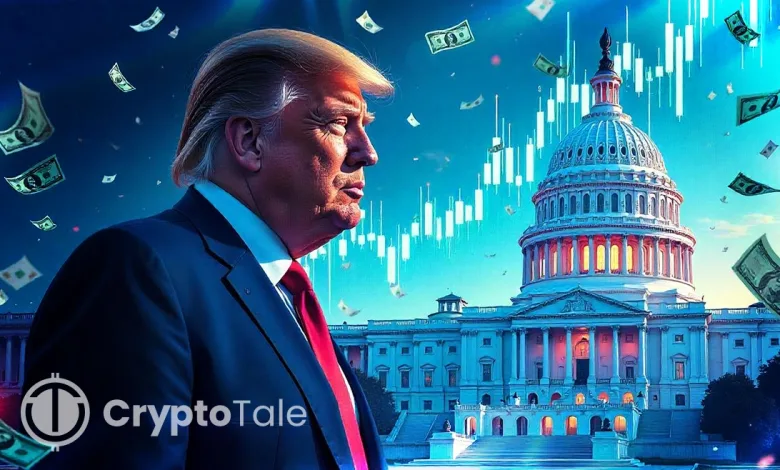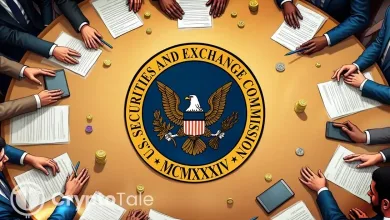Trump’s 25% Tariffs Hit Asia as EU Deal Gives Stocks Hope

- Trump placed 25% tariffs on Japan and others, which made global markets fall quickly.
- A new EU deal with 10% tariffs gave investors a small hope for trade peace.
- Many online users now feel regret after voting for Trump and are seeking better answers.
President Donald Trump has imposed a 25% import tax on goods from Japan and South Korea, while extending fresh tariffs to 12 other nations, with enforcement set to begin on August 1. The move triggered a global market reaction, sending stocks down and currencies tumbling. Meanwhile, the U.S. has proposed a 10% tariff deal with the European Union to ease rising tensions.
Broad-Based Tariffs Ignite Global Market Selloff
On July 7, Trump issued letters through Truth Social, informing global leaders of the impending tariffs. He addressed Japanese Prime Minister Shigeru Ishiba and South Korean President Lee Jae-myung directly. The letters warned against retaliation, threatening to add their counter-tariffs on top of the existing 25%. “If for any reason you decide to raise your tariffs,” Trump wrote, “then, whatever the number you choose… will be added onto the 25% that we charge.”
The Japanese yen dropped 1% to a two-week low, while the South Korean won also weakened. U.S. indices experienced immediate downturns, with the S&P 500 declining 0.8%, the Nasdaq falling 0.9%, and the Dow dipping 0.9%. Tariffs also targeted Bangladesh (35%), Cambodia (36%), Indonesia (32%), Thailand (36%), Bosnia (30%), Tunisia (25%), and Serbia (35%). These were part of an extended “national emergency” tariff framework, initially set to expire on July 9, but now extended to August 1 to allow for negotiations.
Investors reacted swiftly. Analysts now warn of rising inflation and a potential decline in GDP of 0.8% to 0.9% by year-end. An estimated $1,200 in extra costs per U.S. household is projected in 2025 due to tariff pass-through. Bond yields surged, and the U.S. dollar strengthened, reflecting a shift in market positioning toward defensive assets. Market strategists said the abrupt policy shift would “deepen volatility and threaten corporate earnings.”
Online Sentiment Turns Sour on Trump’s Economic Handling
Sentiment on X revealed rising frustration. One user wrote, “Thought tariff war was over,” echoing public regret over Trump’s 2024 re-election. Another sarcastically asked Grok to “explain to me like I’m 5 years old,” reflecting confusion and disillusionment. Grok replied with an analogy comparing nations to families trading toys, capturing the mood with simple clarity.
Wider discussions questioned the logic behind country selections, especially those without trade imbalances. A user asked, “What’s the theme here?” amid criticism of economic unpredictability. The sentiment is fluctuating heavily as users revisit their support for Trump’s leadership, especially as market stability comes under stress.
Related: Congress Passes Trump’s ‘Big, Beautiful Bill’ with Tax Cuts and Spending Cuts
EU Trade Offer Brings a Glimmer of Market Stability
On July 8, the administration made a calculated pivot by offering the EU a 10% tariff deal, aiming to prevent further escalation. Politico reported that the “skinny deal” excluded key sectors like aircraft parts, spirits, and medical equipment. The offer followed direct talks between Trump and European Commission President Ursula von der Leyen. Markets responded with little optimism, viewing the deal as a signal of possible trade stabilization.
Goldman Sachs upgraded its S&P 500 outlook, citing hopes of avoiding a full-blown trade war. Analysts suggested that avoiding harsher tariffs could protect multinational corporate earnings. U.S. equity futures held steady, and Asian markets found support from the improved diplomatic tone.
While there were some market turbulences due to tariffs under Trump, Musk’s launching of the America Party provides a breath of fresh air. Developed as an agenda of fiscal conservatism, pro-innovation, and debt reduction, without concerns over partisan gridlock, Musk intends to contest key congressional seats to institute balance and stability. This is ambitious, although his tech front and bankability may invigorate centrist voters in the markets and bring back investor confidence. This is indeed uncertain; at least, Musk’s foray stands as a beacon of pragmatic politics and possibly marks a market recovery.




